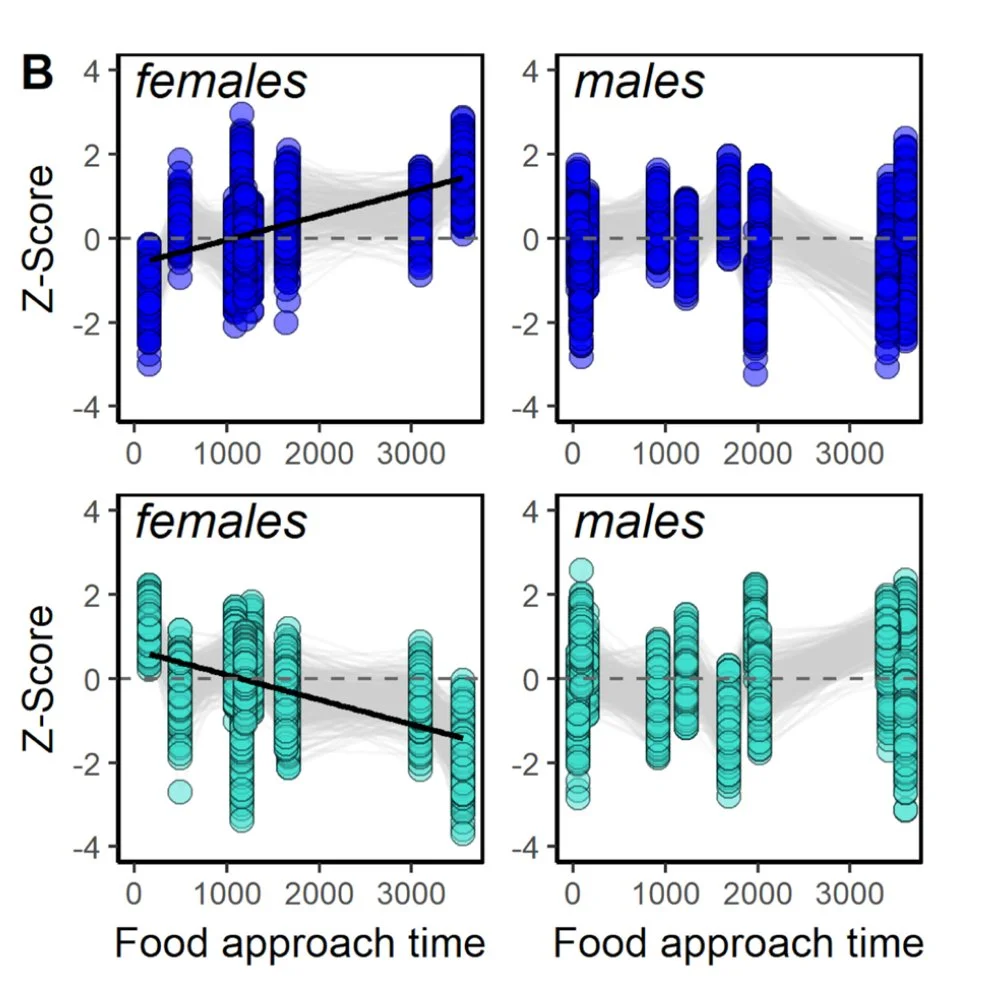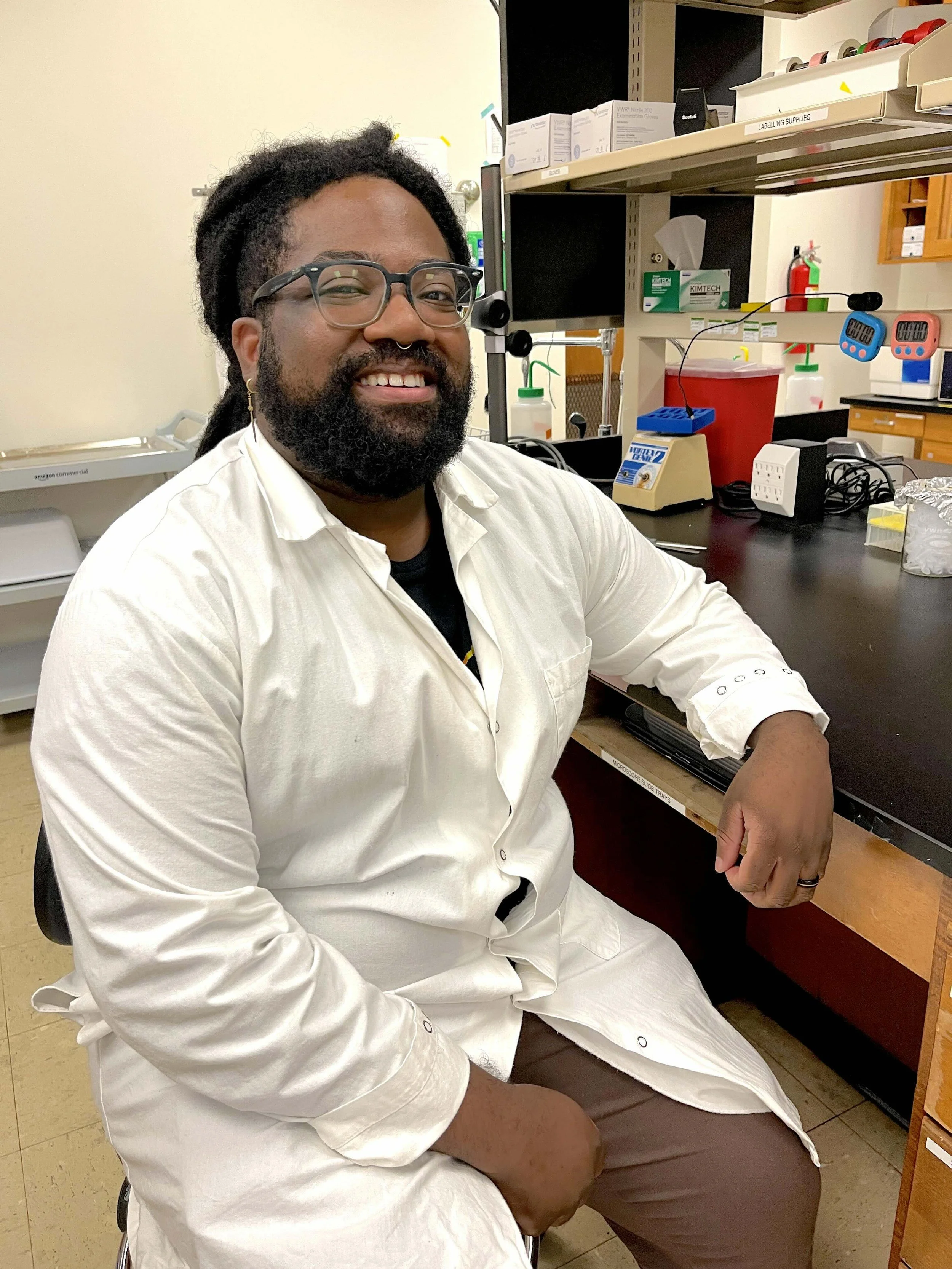What we can learn from sparrows, starlings, and lizards
To some people, house sparrows, Eurasian tree sparrows, European starlings, and brown anoles are cute little animals. Others see these non-native species more negatively, as invaders that compete with and displace native species like purple martins, Eastern bluebirds, and green anoles. To us, they are an invaluable resource that allows us to improve our understanding of the impacts of stress on animals and humans, and reveal what allows wildlife to thrive in new environments.
Our lab studies how different neurotransmitters and hormones help wild animals successfully cope with environmental challenges from predators to disease. The hormone and neurotransmitter pathways we study are very similar in in all vertebrates from fish to birds to mammals, so sparrow, starling, and lizard research can help us understand how these systems work in humans and other animals.
Lab News
Dec 2025
New paper alert! The lab’s collaboration with Sara Lipshutz of Duke University & Alex Bentz of the University of Oklahoma found that Eurasian tree sparrows, a less-successful invasive cousin of house sparrows, had distinct patterns of gene expression associated with novelty avoidance that differed by sex. This work originally arose from a Senior Honors Thesis written by LSU undergraduate Ella Cochran.
Expression of genes in the blue (top) and turquoise (bottom) modules (created using weighted gene co-expression network analysis) were significantly associated with novelty avoidance behaviour in female Eurasian tree sparrows but not in males.
Sept 2025
The lab’s research on house sparrows and Eurasian tree sparrows is featured in Chapter 2 of David Stipp’s new non-fiction book, “Why Rats Laugh and Jellyfish Sleep: And Other Enchanting Stories of Evolution.” The book is available September 23, and also features chapters on fun scientific topics such as the smelliness of skunks, earthworm intelligence, and the role of grandmothers in human evolution.
Aug 2025
Congratulations to PhD student Marquise Henry, who is one of this year’s class of HHMI Gilliam Fellows! This fellowship recognizes exceptional graduate students and their advisors who demonstrate scientific excellence and a commitment to fostering inclusive research environments. You can read more about Marquise and the Gilliam Fellowship on the LSU College of Science website!
PhD student Marquise Henry, who is part of this year’s class of 2025 HHMI Gilliam Fellows.
Aug 2025
Two new students joined the lab this month! LSU LAGNiAppE postbaccalaureate scholar Ellie Rice is leading a project looking at links between behavior and the microbiome in house sparrows, while undergraduate researcher Lauren O’Callaghan will be assisting with several ongoing projects in the lab. Welcome Ellie and Lauren!
May 2025
Lab members received several awards this spring, in recognition of their excellent research and teaching! Former lab undergraduate Ella Cochran was the winner of the LSU Ogden Honors College Outstanding Capstone Award in the category of Life Sciences for her Senior Honors Thesis. Undergraduate Danna Masri received a Distinguished Undergraduate Researcher recognition from the LSU Office of Undergraduate Research and the Undergraduate Research award from the Department of Biological Sciences. From the LSU College of Science, former PhD student Dr. Melanie Kimball won the Distinguished Dissertation award, and Dr. Christine Lattin received a Graduate Teaching award. Congratulations to all!
Danna Masri accepts the Department of Biological Sciences Undergraduate Research Award, and Dr. Lattin receives the College of Science Graduate Teaching Award, at the LSU College of Science Awards event.
Danna Masri receives a Distinguished Undergraduate Researcher recognition from the LSU Office of Undergraduate Research.
May 2025
A new collaborative paper from the lab (led by former lab undergraduate Kenedi Lynch) found male wild turkeys in Louisiana were more likely to be infected with leucocytozoon parasites than females. Overall, we found very high rates of avian malaria infection, suggesting the parasites may be one reason turkeys have declined locally.
Data from Lynch et al. 2025, where we found that only 2% of all turkeys sampled (out of 106 total) were free from all avian malaria infections.
June 2025
Congratulations to lab PhD student Katie Stewart, who received an NSF GRFP Honorable Mention! Katie’s Honorable Mention places her among the top applicants nationwide for this prestigious fellowship, and we are all very proud of her accomplishment.
May 2025
A new paper out from the lab (led by undergraduate Blake Dusang and PhD student Marquise Henry) builds on past work in the lab and finds that not all "neophobia" tests give the same results. Specifically, sparrows’ responses to novel objects & novel environments were not consistent within individuals, suggesting these two tests are actually measuring different underlying personality traits.
This image gives the background for the Dusang and Henry et al. 2025 paper. Researchers often assume that different types of neophobia tests (e.g., to novel objects, foods, and environments) should elicit consistent responses from the same animal, but this assumption is rarely tested.
April 2025
Three lab members - post-baccalaureate scholar Elena Liebl, and undergraduates Caroline Henry and Danna Masri - presented their research on physiology and behavior at the LSU Discover Day conference, and they all did a fabulous job!
Undergraduate researcher Caroline Henry with her poster on captivity-induced changes in the microbiome of lizards.
Post-baccalaureate scholar Elena Liebl presents research on links between color and behavior in anoles.
Undergraduate researcher Danna Masri presents work on links between neophobia and other behaviors in house sparrows.
April 2025
Three amazing undergraduate researchers, Ilea Kuo, Hermione Lam, and Danna Masri, defended their Senior Honors Theses from the lab this month! They will all be going on to medical school, and we know their research experiences will make them excellent evidence-based physicians. Congratulations Ilea, Hermione, and Danna!
Ilea Kuo presents data from her Senior Honors Thesis on rates of avian malaria found in wild European starling nestlings.
Hermione Lam discusses hypotheses from her Senior Honors Thesis on gene expression in avian skin.
Hermione Lam, Ilea Kuo, and Danna Masri looking happy and relaxed after the successful defense of their Senior Honors Theses!
Danna Masri presents data from their Senior Honors Thesis examining whether sparrows that are more likely to avoid novel objects also show more beak wiping behavior.
March 2025
We previously showed corticosterone is involved in neophobia (novelty avoidance) in house sparrows; my PhD students Marquise Henry and Melanie Kimball's new paper found that this effect does not appear to be mediated via low-affinity glucocorticoid receptors, because blocking these receptors did not change neophobia behavior.
Survival curves of sparrows' latency to feed in the presence of novel objects with and without injections of a vehicle control (top graph) or the glucocorticoid receptor antagonist RU486 (bottom graph). There was no difference between weeks or treatments, suggesting the effects of corticosterone on neophobia that we previously observed are mediated via a different physiological mechanism.
Feb 2025
Several lab members attended Kids’ Day at the Museum at the LSU Museum of Natural Science, teaching local 4th-6th graders about neurobiology and the kinds of research we do in our lab. It was a fun event for all!
Lattin Lab PhD student Marquise Henry uses arm wrestling to demonstrate nerve impulses in an active muscle via electromyography.
Lattin Lab PhD student Katie Stewart shows how electrical impulses can be converted into sound waves using a small device.
Jan 2025
Several Lattin Lab members attended and presented research at the Society for Integrative and Comparative Biology meeting in Atlanta Georgia this month. Everyone did a great job, and we enjoyed meeting other scientists from all over the world.
PhD student Marquise Henry gives a talk about his neophobia research at the Society for Integrative and Comparative Biology annual meeting in Atlanta.
Undergraduate Blake Dusang gives a talk about her research examining differences in how sparrows respond to different types of novelty.
LAGNiAppE postbacc scholar Elena Liebl presents her undergraduate research from Oklahoma State University on aggression and exploration in crickets.
Undergraduate Danna Masri and PI Christine Lattin stand at Danna’s poster about behavioral syndromes in house sparrows at the 2025 Society for Integrative and Comparative Biology annual meeting.
Olivia Saari (left) and lab PhD student Katie Stewart (right) present their undergraduate research from Trinity University on fledgling order and sibling competition in titmice.
Former LAGNiAppE postbacc scholar Emily Stelling with her poster on corticosterone in invasive brown and native green anoles.
Dec 2024
Dr. Lattin was a collaborator on a new paper led by Kevin Pham from the Wada Lab at Auburn University. The paper’s results suggest that artificial light at night may have caused metabolic disruption in zebra finches in the lab, increasing their body mass and glucose concentrations, with limited impacts on corticosterone secretion.
Dec 2024
Two undergraduate researchers in our lab graduated this month! Congrats to Ella Cochran and Blake Dusang, who will be much missed and are sure to be brilliant at whatever they do next.
Undergraduate researcher Ella Cochran receives her honors hood and cord from Drew Lamonica Arms from the LSU Ogden Honors College.
Blake Dusang presents her research poster to listening students at a summer undergraduate research conference.
Dec 2024
Warmer springs can increase hatching asynchrony in birds, and in the lab's new paper (led by former PhD student Keegan Stansberry) we found asynchrony has persistent negative effects on free-living European starling nestlings, esp the smallest "runts," who have reduced survival, body size, and circulating glucose levels, and potentially disrupted stress hormone levels.
The smallest chick from nests where nestlings hatched over multiple days (i.e., not synchronous) tended to have higher baseline corticosterone (Cort) and lower stress-induced corticosterone compared to smallest chicks from nests that hatched on the same day. These patterns of hormone secretion may be signs of developmental stress in these nestlings. From Stansberry et al. 2024.
Dec 2024
In a recently published study of house sparrow gut microbiomes before and after malaria exposure, we found several bacteria that were more prevalent in malaria-resistant sparrows, suggesting these bateria may help protect sparrows from infection. This project was the senior honors thesis of undergraduate researcher Riley Noble (also the co-first-author!)
Panels A-C show three indicator species that significantly differed in prevalence and abundance between resistant and infected house sparrows before inoculation with Plasmodium relictum (a naturally occurring strain of avian malaria). From Noble et al. 2024.
Nov 2024
Four former undergraduates from the lab who are now in MD, PhD or MD/PhD programs were highlighted in a very nice feature story on the LSU College of Science blog. We are so proud of our amazing undergraduate researchers and it is an honor and a privilege for us to help train Louisiana’s next generation of doctors and scientists.
Kaitlin Couvillion, former lab member and current LSU Health New Orleans MD/PhD student.
Eve Gautreaux, former lab member and current neuroscience PhD student at the University of Pennsylvania.
Allison Cannon, former lab member and current LSU Health New Orleans medical student.
Ayushi Patel, former lab member and current PhD student at LSU Health New Orleans.
Nov 2024
Four members of the Lattin Lab are collaborators on the first ever ManyBirds project examining aversive behavior towards novelty (neophobia) in 136 different bird species! Overall, we found that neophobia was higher in some bird families than others, that birds with a specialized diet were more neophobic than those with a broader diet, and that migratory species were more neophobic than non-migratory species. You can read the preprint here.
Color-coded latency difference scores (latency to touch food in the novel object condition minus latency in the control condition; measured in seconds) for all bird species included in ManyBirds study 1 (n = 136).
Nov 2024
Congratulations to lab member Ella Cochran, who successfully defended her Senior Honors Thesis on gene expression in three behaviorally relevant brain regions in Eurasian tree sparrows (Passer montanus). Ella did an amazing job with a really technically difficult project, looking at how a bird’s sex and behavior affected what genes were “turned on” in the brain.
Nov 2024
Members of the lab with their painted but not yet fired celebratory mugs.
The 6th annual Lattin Lab retreat was a lovely day involving board games, a potuck brunch, and the painting of celebratory mugs at BellyFire Pottery Studios.


































